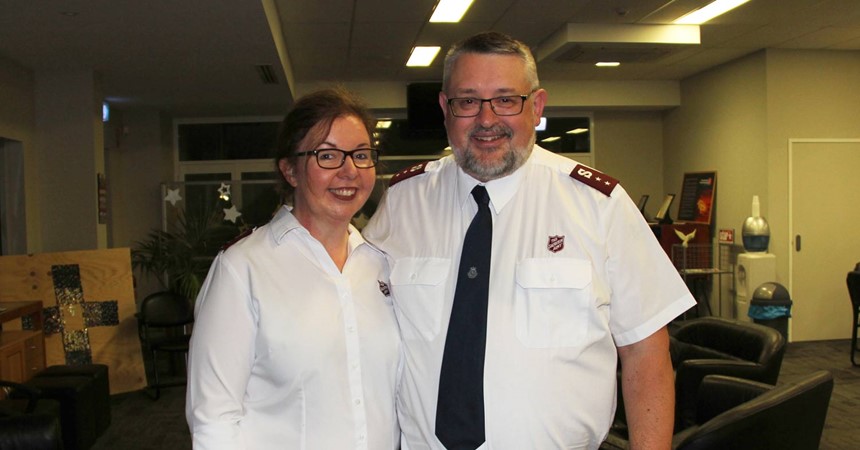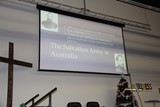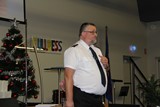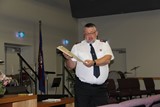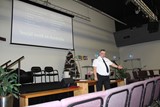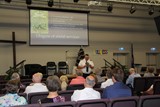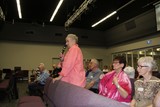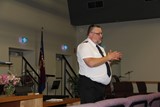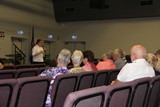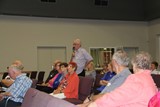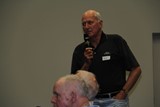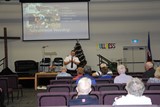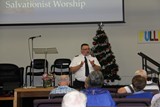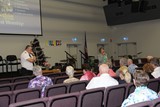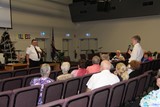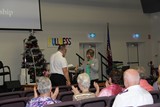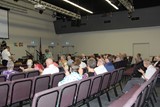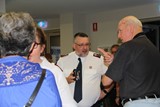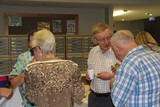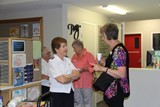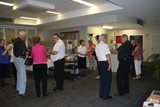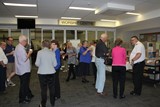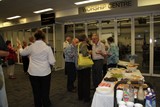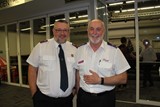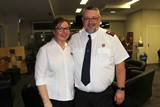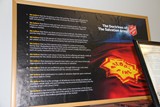Members of the community gathered to explore the faith tradition of the Salvation Army – its origin, beliefs and what happens at the Hamilton entre. The forum was presented by Captain Stephen Oliver who is a leader at the centre, along with his wife, Lynley. Having both trained and served in the UK, Stephen and Lynley were appointed two years ago to serve in Hamilton. Stephen explained that by serving in an international movement such as the Salvation Army, one must – with consultation – be willing to accept appointment wherever in the world you are sent. This is exactly how Stephen, Lynley (who is originally from Australia) and their two children found themselves in Newcastle. “The chance to contribute to Lynley’s homeland has always been very important to us” and it is “a privilege to serve this city”, Stephen says. Encouraging audience members to ask questions and to give feedback during the course of the evening, Stephen began with the origins of the Salvation Army.
Origins
William and Catherine Booth founded the movement in 1865 in East London. It was originally named the Christian Revival Society, then the East London Christian Mission (or ELCM). Described early as a ‘volunteer army’ and with Booth being described as a ‘General’, the name soon became the ‘Salvation Army’ in 1878.
In 1880, Edward Saunders and John Gore arrived as immigrants and met in South Australia. They formed a Salvation Army Corps in Adelaide and preached the gospel from the back of a cart in the Adelaide Botanical Gardens. They appealed to General William Booth in England to send more officers to Australia and within three years, 32 officers were commissioned and 12 corps and 3,600 soldiers were recruited.
Beliefs
Stephen spoke about the 11 articles of faith, or Doctrines of the Salvation Army.
For more information, visit https://salvos.org.au/newcastle/about-us/our-beliefs/
What makes the Salvation Army distinctive?
Salvationists are realistic – specifically, realistic about human sin. “It is not about ourselves, but what God can do for us and accepting Him”, Stephen states, “Living for eternity and holding things of the world lightly”. It also takes great discipline for those who sign the soldier’s covenant and are required to abstain from drinking and other stimulants.
The purpose of the uniform is to be visible and audible – seen and heard; to tell the world that one meant war. Stephen described how when travelling on the London underground, he’d been asked more times for directions to the District line than he was about Jesus, but while being a challenge, wearing the uniform is a reminder of the covenant that he had signed.
In 1890, William Booth wrote a book titled In Darkest England and the Way Out, which became a blueprint for social services. Stephen then held up an image which features in the front of Williams book – an image of a lighthouse and people who had been shipwrecked, being pulled out of the sea. The message conveyed was that of the church shining a light into the darkness – on all the problems to be addressed, such as poverty, homelessness and drug addiction.
What happens here (Hamilton)
The Olive Branch Café is a training café which helps young people gain basic skills and the opportunity to obtain a Certificate III in Hospitality. It includes skills such as customer service, money handling and how to make a cappuccino – “an important life skill for anybody”, Stephen adds.
The people who are being helped through the program are high risk, long-term institutionalised people – and their lives are being changed.
Hamilton also provides referrals; emergency relief; worship services; bible studies and “all the things a church does”; rural missions; and bush fire relief to name a few.
A new program called Drive for Life is starting in Hamilton soon to help people get their driver’s licence. The service will assist people who otherwise may not be able to accrue 120 driving hours. Imagine the opportunities for evangelism when you have a young person sitting in a car for an hour with a Christian!
Worship Service
Stephen described a typical worship service consisting of contemporary music and a brass band. People are encouraged to participate from the floor. At every Salvationist meeting, it is important to provide the opportunity to respond. It is Stephen’s view that the high point of Salvationist worship is prayer – an opportunity to respond through the coming forward to the ‘mercy seat’ to ask for prayer and to pray for others.
Social Services provided by the Salvation Army in Australia: Aged Care Services; Alcohol & Other Drugs; Court & Prison Services; Counselling; Disability Services; Disaster Relief; Emergency Relief; Employment Services; Family and Domestic Violence; Family Support; Family Tracing 1885; Financial Assistance; Housing; Meal Services; Problem Gambling; Youth Matters; Professional Standards Unit.
The presentation was followed by a short Q&A session and the opportunity for conversation, tasty treats and a cup of tea.
Q&A
Q: What is the military significance of the Salvation Army?
A: It is about the fighting for the souls of men; a war to be won; a spiritual battle.
Q: I’m intrigued about the idea of a mercy seat. Please explain what happens.
A: The mercy seat has no power or significance as an object – it’s just a piece of wood. Its significance is that it represents years and years of dedication. It’s also that it is a physical action (coming forward). When going up to the mercy seat for the first time – it’s a long way, a long walk – and it’s that public expression of saying, ‘I’m in need of God’s grace’ – it’s powerful.
Q: What is the process of becoming a soldier?
A: I believe becoming a soldier to be a calling to a lifestyle, a covenant. There is a course of instruction (at one time offered as a 12-week program, now offered as an intensive program).
